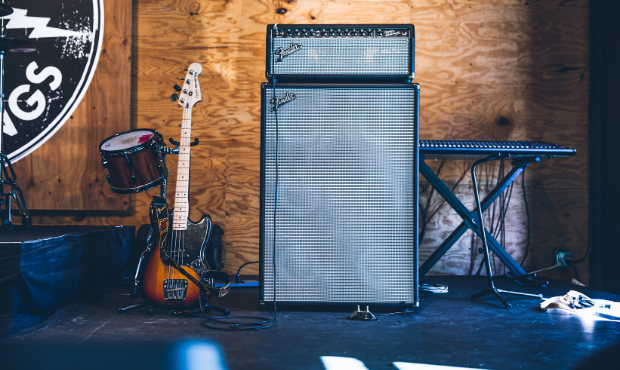Musicians find creative ways to make money as venues close, festivals cancel
Mar 18, 2020, 1:05 PM

(Photo by Austin Neill/Unsplash)
(Photo by Austin Neill/Unsplash)
With entertainment venues closed and concerts and festivals canceled, including SXSW, many professional musicians are temporarily out of work.
“We can’t get unemployment insurance. There is a huge swath of the population that doesn’t have W2 income,” said Skerik, a Seattle saxophone player who fronts Skerik Band, and has performed with artists like Pearl Jam and Bonnie Raitt. “I just read that New Orleans Jazz Fest might get canceled. If that happens, I have no income through May. I have no idea what I’m going to do.”
Last weekend, Skerik canceled the last three stops of his northwest tour and put together a virtual concert instead. He had a four person crew doing audio and video, and one of his band members spent two sleepless days and nights building a website from scratch that would allow them to stream the show from the studio in his backyard.
“It’s very complicated if you want it high quality,” Skerik said. “This was not, ‘Hey, I’m putting my phone up on my couch, dude!’ and singing some songs. No way! This was not Facebook Live, this was totally professional audio quality, like going in to a studio.”
But the work paid off: People showed up to watch and donate.
“The last three shows of the tour were in Olympia, Bellingham, and Seattle, and we probably would have made around $2,500,” Skerik said. “So we did the virtual show Sunday evening and people donated around $4,100. But instead of splitting it four ways, we had to split it 12 ways. There was a large crew and we definitely lost a lot of money. But it was a real fun experiment to do and it was amazing. People got to see us play all over the country.”
Oakland, Calif., musician Deren Ney said now is the perfect time for musicians to take back the industry, after decades of losing money to record companies and streaming services like Spotify.
“As depressing as this may seem right now, it’s actually a great excuse to start getting good at other things,” Ney said. “To take a break from the road and be forced to figure out some new ways to reach your audience, to monetize various things that you do that you may not even see the value of. To find some way to make up that gap between all of the money that’s being siphoned off to these streaming companies and all the musicians who are actually doing the work.”
He encourages people to think deeper, beyond traditional touring, to be more creative, and to use YouTube as a way to make money; but not just a video of you playing a song in your bedroom.
Ney has some experience in this arena. When touring with his former band, Nicki Bluhm and the Gramblers, they used a rubber band to attach a cell phone to the rear view mirror of the van and recorded themselves playing and singing old radio hits while they drove from show to show. Their seventh video, a cover of Hall & Oates “I Can’t Go For That,” went viral overnight and scored them countless show bookings and an appearance on Conan O’Brien.
“The first instinct for most people, I think, is streaming,” Ney said. “I’ve been seeing people doing that this week, and it’s great, but that’s a pretty rudimentary thing at this point. So I’m suggesting people really try and think of something that doesn’t exist yet. Especially now that every band you know will be throwing their phone up and streaming. Come up with a hook for your show. Why doesn’t someone do ‘Hee Haw?’ Where there’s jokes and skits interspersed with playing some songs. It might make me donate five bucks.”
Being on the road can be tough on musicians, often leading to depression, alcoholism, drug abuse. Ney wonders if making and selling virtual content could help artists lead more normal lives.
“I felt for a long time that what we’ve expected from musicians is a little grotesque,” Ney mused. “I think there’s something weird about the fact that we sort of romanticize the pirate aspect of it, the partying and the travel and everything is so intense, but we sort of think that’s fun. A lot of the allure is that these sort of buccaneers are out there and if we buy a ticket and go to a show for two hours, we can kind of peak in on what we imagine to be this endless adventure. Now there’s room for people to take better care of themselves, to tour less, to hopefully have a bit more of a humane approach. So hopefully once it’s time to get back to that [touring] cycle, you can say, we’re not going to go on 200 days of tour this year. Which I’ve done before, it’s crazy, you lose your whole life. But instead, we’re going to do 50 days of touring, but we’re also going to do these regular live streams.”
For restaurants to survive the pandemic, order delivery and takeout
When venues reopen and live shows return, why not add a virtual option? If a live show is sold out, you could sell additional virtual tickets, which would make a band more money and appeal to those who no longer like to venture out for late night shows.
Times of crisis can breed creativity, and perhaps we can use this time to restructure the way we approach entertainment.
Listen to Rachel Belle’s James Beard Award nominated podcast, “Your Last Meal,” featuring celebrities like William Shatner, Rainn Wilson, and Greta Gerwig.













